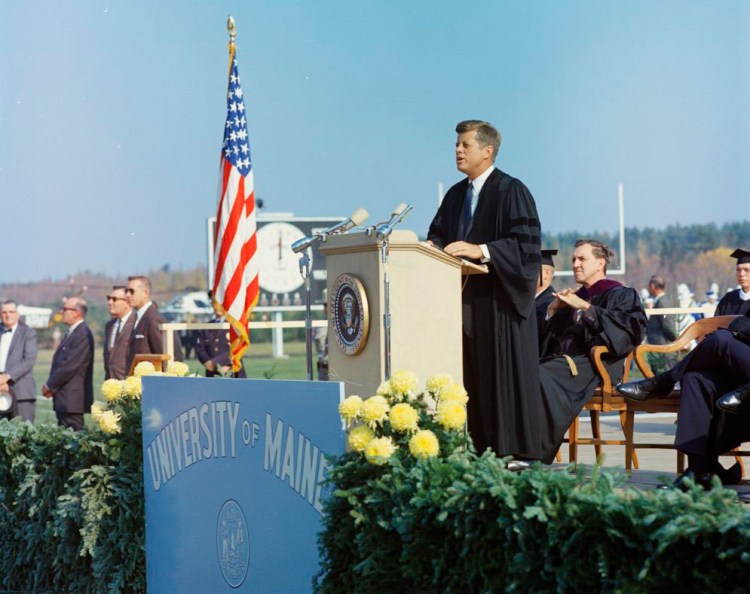Oct. 19, 1814: In an era when Maine remains part of Massachusetts, three men representing Maine counties in the Massachusetts Senate ask the Massachusetts General Court (the state legislature) to appoint a committee to consider raising a force to drive British troops out of eastern Maine, which those troops recently attacked and occupied.

The General Court does nothing in response to that appeal or to one submitted a month later.
Oct. 19, 1963: Only 34 days before his assassination in Dallas, President John F. Kennedy delivers a foreign policy address at the University of Maine, in Orono.
In his speech, the president thanks the university for the honorary degree it is giving him, calls the American college and university system a national asset and looks forward to a peaceful end to the Cold War. He also reflects soberly on the outcome a year earlier of the Cuban Missile Crisis, in which the United States and the Soviet Union, mobilizing their forces and employing a high-stakes form of cat-and-mouse diplomacy, barely avoided a nuclear conflict.
“Some hail it as the West’s greatest victory; others, as a bitter defeat,” Kennedy tells his UMaine audience. “Some mark it as a turning point in the Cold War; others, as proof of its permanence. The fact of the matter is, of course, that neither view is correct.”
U.S. Sen. Margaret Chase Smith, R-Maine, and other Maine dignitaries join the president on stage.
Oct. 19, 2002: The C.F. Hathaway shirt factory, the last major manufacturer of shirts in the United States, closes in Waterville, putting 235 people out of work.
The closure is part of a larger pattern of clothing makers going out of business around the same time in Maine, falling prey to cheaper competition from overseas.
Charles F. Hathaway founded his shirt-making company in the mid-19th century on Appleton street in Waterville. By the mid-1950s, the company had prospered and was known for the quality of its shirts as well as its “man with the eyepatch” advertising.
The company moved in 1956 to the site of the former Lockwood Mill, which had closed the previous year, laying off 700 workers. Shirt manufacturing continued at the old mill building next to the Kennebec River under the Hathaway company and its successor, Warnaco, for 46 years before the closure.
Private developer Paul Boghossian’s purchase of the mill building and other former Lockwood property occurs in 2006. They now house health care offices, retail shops, apartments and recreational spaces.
Joseph Owen is an author, retired newspaper editor and board member of the Kennebec Historical Society. Owen’s book, “This Day in Maine,” can be ordered at islandportpress.com. To get a signed copy use promo code signedbyjoe at checkout. Joe can be contacted at: jowen@mainetoday.com.
Send questions/comments to the editors.


